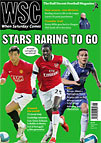 Leigh RMI are no more. Gary Andrews struggles through the marketing speak and reports on their new identity
Leigh RMI are no more. Gary Andrews struggles through the marketing speak and reports on their new identity
Renaming a team after one of Britain’s most derided soft-rock bands may not be the most conventional method of attempting to revive a club after two relegations in three years. But then Leigh Railway Mechanics Institute, now Leigh Genesis, are anything but conventional.
New chairman Dominic Speakman took over in mid-June and quickly set about revamping and renaming the Unibond Premier team. Out went the traditional red stripes and in came full-time players, white shirts, black shorts, and an Xbox-style logo that will take the place of a shirt sponsor this season in an effort to build the Genesis brand.
To read the press release is like sitting in a marketing meeting where everybody throws around buzzwords but nobody has a clue what they mean. On the name change, Speakman’s blurb says: “After endless brainstorming, we feel that we have found a name that really works on many levels; the word Genesis, meaning ‘an origin, creation, or beginning’ fits perfectly with the new image of the Club, its move to a new stadium and the new structure both on and off the pitch. The name also avoids the clichéd ‘animal’ type names used by many American sports, yet is a very fresh and ‘snappy’ word.” Never minding that RMI was a unique suffix, words such as United or Athletic clearly don’t fit a team that refer to themselves as “Britain’s most forward-thinking club”.
In many respects it shouldn’t be a surprise that Leigh are aping an NFL franchise. The club were the forerunners of the MK Dons. In 1995 the directors of Horwich Railwayman Mechanics Institute decided their ambition had outgrown the town. The club was uprooted seven miles west, to a town without a railway station, and became Leigh RMI. When Speakman highlighted the locals not feeling any connection to the RMI name, he, however unwittingly, had a point. But indifference from Leigh to the club goes further than that. Horwich was close to Bolton and football country. Leigh, being nearer to Wigan, is a rugby league town with the majority of locals preferring to cheer on Leigh Centurions.
It’s not the first time Leigh have tried to cut all links to the Horwich part of their history. Just after FC United of Manchester were formed, Leigh offered to merge with the anti-Glazer rebels. The offer was turned down on the basis that a team formed in protest at the takeover of a club shouldn’t come into existence by taking over another club.
With rugby fans in their home town and many original supporters feeling disenfranchised, it’s not surprising RMI’s average attendance last season stood at 202, with crowds rarely topping the 250 mark. Low numbers have been a feature of Leigh’s support, even when the team spent five seasons in the Conference before relegation in 2005. But these attendance figures haven’t troubled the board as, from September, they’ll be moving to a 10,000-seat stadium, shared with the Centurions. Even if everybody who joined the team’s Facebook group turns up – just under 500 at the last count – they still won’t have a problem finding a seat.
But among those fans the reaction has been largely positive, with the only real criticism being that the name Genesis may be a bit daft. It’s not hard to see why Speakman’s revolution has been greeted so enthusiastically. Without his cash, the Railwaymen would probably have continued their downward spiral. Now those fans have something to cheer about, for the time being, in a full-time team featuring players who could be with clubs higher up the pyramid. Leigh Genesis are now favourites for promotion from the Unibond – along with Bradford Park Avenue, another team with a “visionary” chairman with a large cheque book and plans for a new stadium with a capacity way in excess of current crowds.
But Genesis would do well to note another short-lived name in non-League football – Colne Dynamos. The Dynamos also went full-time at Northern League level before being refused entry to the Conference in 1990 and then folding. Indeed, non-League football is littered with many recent examples, such as Grantham Town, Weymouth, Canvey Island and Hornchurch, who’ve overstretched themselves on an unsustainable financial model. Many of these are still in the recovery stage and it would come as no surprise if Leigh joined them on the crisis list. A futuristic logo and a distinctive brand may get plenty of press, but this won’t necessarily translate into bigger crowds. And it’s the crowd’s rather than a chairman’s “vision” that will ultimately determine their success or survival.
From WSC 259 September 2008